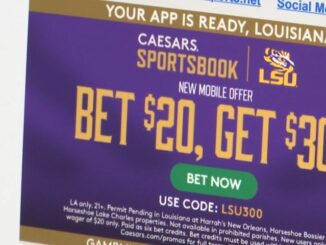
After the legislature passed a bill banning all Louisiana colleges from promoting sports betting, LSU is ending its seven-figure deal with Caesars Sportsbook, a spokesman said.
The move comes after Senate Bill 191, which would prohibit any college or university from entering marketing or advertising partnerships in Louisiana, passed the House on Tuesday and has been sent to Gov. Edwards to sign or veto.
LSU and Caesars announced the multi-year partnership in September 2021, two months before the state’s sports betting law went into effect.
Facilitated by PlayFly Sports, LSU’s third-party multi-media rights holder, the partnership allowed naming rights for the new Caesars Sportsbook Skyline Club at Tiger Stadium. Caesars Sportsbook got signs in Tiger Stadium, the Pete Maravich Assembly Center and Alex Box Stadium as well as an exclusive presence on the LSU Sports Mobile App.
The agreement provided broadcast and digital sponsorship rights.
The deal, and similar ones at other universities, drew national scrutiny, including a New York Times story that drew particular attention to mass emails LSU sent to students promoting betting through Caesars Sportsbook.
Caesars executives told the Times that the email mistakenly went out to underage students.
In March, the American Gaming Association adopted new “Responsible Marketing Code” regulations in March that prohibit any “college partnerships that market or advertise sports wagering activity.”
State Sen. Gary Smith, D-Norco, then proposed Senate Bill 191 to put those rules into Louisiana law.
“When we saw that, it really kind of dawned on us that we’re glad the industry is taking their own approach to this, but there’s probably something we should have done in the first place here in Louisiana,” he said. “Just to keep that separation between some of our youngest individuals, who are just hitting that legal age, and the industry.”
With sports betting generating more revenue that was originally expected following its introduction to the state in 2021, Smith said SB 191 would take the American Gaming Association regulation and turn it into Louisiana law.
“We’re generating more than we thought it would generate and that means people are playing more than we thought they might,” he said. “So much deals around college sports and we want to just try and keep that separation especially for our students, we don’t want them tied up in the middle of that with advertisements seeming like they are the sponsor of the school or the preferred site of the school.”
Jim Henderson, University of Louisiana system president, said he supports the bill as a reflection of the Responsible Marketing Code regulations.
“We’ve got some cognitive dissonance there because why would we be signing on to a marketing agreement when the majority of the market that we’re going to be sharing it with are not legal participants in the gaming industry?” Henderson said. “So I think the bill makes a lot of sense, but it also follows some industry norms that have emerged.”
Henderson said the UL System has no current agreements with sports betting industries and the bill will not impact how the universities under its system operate.
“You hope things don’t have to necessarily be codified in law and certainly we have the option to not do that, but this is a serious enough issue that it makes sense to codify it into law,” he said. “It certainly won’t impact our institutions in a negative way and it won’t have an impact on the primary purpose for our institutions, which is students.”
The bill does maintain an exception for alumni networks who promote content solely focused on responsible gaming initiatives or gambling problem awareness.
Last week, the NCAA released survey data indicating 67% of on-campus students participate in sports betting and 58% of all surveyed students had placed a bet at least once. The survey queried a total of 3,527 students, all between the ages of 18 and 22 years old.
For Smith, SB191 will serve as a protection for college students, rather than a change in how the promotion or advertising of sports betting works for most Louisiana residents.
“It’s pretty basic in that it’s not going out there and making some sweeping change, we’re probably going to be playing catch-up with a few of these things as the industry evolves,” he said. “The industry has evolved and grown really quickly, so this is one of those things where we want to get in there and take care of this before it changes anymore.”


Leave a Reply